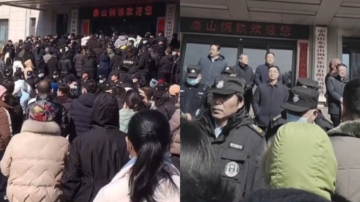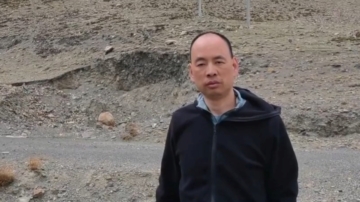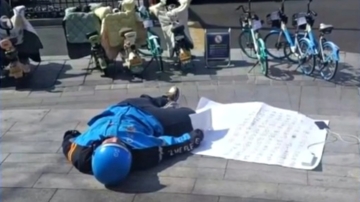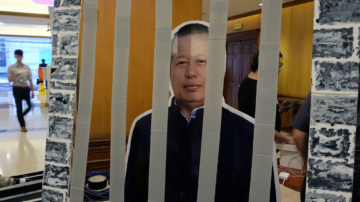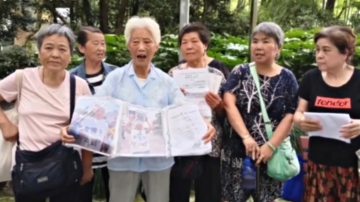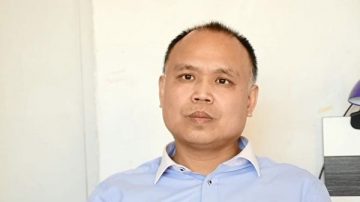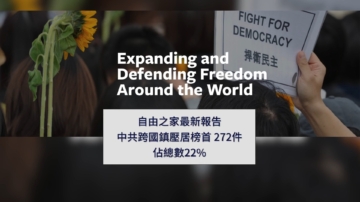【新唐人2013年11月27日訊】湖南湘西民營企業家曾成傑,在今年7月12號被長沙中級法院以「非法集資」罪名祕密處死,當時震動整個中國社會。對此,中共最高人民法院11月25號在官方網站指出,曾成傑案社會危害極大,依法應當核準死刑。此舉再次引起社會大眾的關注與不滿。
曾成傑是原湖南「三館房地產開發集團有限公司」總裁,曾於2005年被評為第二屆「中國企業改革十大傑出人物」。
2008年,被中共湖南當局以涉嫌集資詐騙、非法吸收公眾存款、職務侵佔等罪名拘留、逮捕。2010年一審判決,2011年二審判決,被湖南省高級法院認定犯下「非法集資」和「欺詐投資者」罪。
今年7月12號,曾成傑在代理律師未接收死刑複核裁定書,法院未通知家屬、未安排刑前與家屬會見的情況下,於長沙被執行死刑。
當局對一個民間集資的企業家處以極刑,引起社會強烈不滿,法律、媒體等各界人士紛紛發聲為曾成傑鳴冤。
中共最高人民法院25號在官方網站發佈《最高人民法院刑二庭負責人就曾成傑案答記者問》。
答問指出,此案既嚴重破壞金融管理秩序,又給國家和人民利益造成特別重大損失。
「英國廣播公司《BBC》」報導,中共當局對曾成傑非法集資案的處理引起許多爭議。有人說曾成傑成了湖南地方政府的替罪羊。有人指責湖南地方官員介入企業糾紛,借司法權掠奪民間財富,說這是官員腐敗的新發展。
中國維權律師 唐吉田:「所謂的反腐,如果公民有權直接能夠制約他們,那麼會有意義,如果只是他們內部洗牌,那就沒啥意義,如果要真正取信於民,那就必須要客觀公正,要透明。」
《南方週末》對「曾成傑之死」有系列報導,詳細描述了始末。報導說,湘西是個窮地方,2003年當地政府要興建群藝館、圖書館、體育館,但沒有錢,曾成傑的公司中標,在政府的默許、支持、監督和協調下,向民間集資。
當2008年金融風暴來襲,地方政府突然變臉,民間集資一夜從「合法」變非法,曾成傑等近二十名民營企業家被捕,部分官員被免職。曾成傑被關押三個月後當地法院還沒有立案,湘西政府就將他的公司價值23.8億的資產以3.3億元賤賣。曾成傑最後被處以死刑,妻子和大女兒也被投入監牢。
湖南湘西民營企業家曾成傑之女 曾珊:「這個案子主要是沒有資產評估就結案了,沒有資產評估,就不能說我父親不能還債,如果能還債,那麼他就是無罪的了,但是兩審法院開庭,都沒有提出這個東西。」
中國文化評論家 葉匡政:「對於民營企業的經營糾紛,應該是用民事訴訟或者破產的方式來處理,應該完全尊重公司法的訴訟程序,不應該進行拍賣。進行公開的清算,既使破產了,也不至於判死刑。」
中國文化評論家葉匡政在微博表示,曾成傑案就是新版的「打土豪」,過去「打土豪分田地」,老百姓還能得點好處,如今「打土豪」的收益,早被權貴們悄悄瓜分了。這也是急於悄悄處死曾成傑的原因。他們越這麼做,越表明背後有不可告人的祕密。
葉匡政認為,如今一些地方官員通過介入企業糾紛,借「司法權力」掠奪民間財富,已成為一種悄悄流行起來的貪腐方式。
曾成傑非法集資案和之前的浙江吳英非法集資案一樣,使中國民間集資的問題受到輿論關注。一些民營企業家説,吳英「涉嫌從事非法集資活動」反映出一個深層問題,也就是中國企業的融資渠道被金融利益集團壟斷,正常的民間借貸一直遭到壓制。
也有大陸律師向媒體表示,中共一些貪官本來應該被判死刑,結果被判無期徒刑。《刑法》對老百姓和對官員的適用是採用雙重標準。
採訪/朱智善 編輯/黃億美 後製/孫寧
An Entrepreneur's Death
Zeng Chengjie, a private entrepreneur from Xiangxi, Hunan,
was secretly executed for illegal fundraising.
The news shocked all of China.
On Nov. 25 the Supreme Court stated on its official website
that Zeng caused severe harm to society and deserved the death penalty.
This again caused public concern and dissatisfaction.
Zeng was the former president of Hunan Three Hall
Real Estate Development Group Co., Ltd.
He was named one of 10 outstanding Chinese enterprise
reform figures in 2005.
In 2008, Zeng was arrested on charges of alleged financial
fraud and other embezzlement charges.
The first and second verdict from Hunan Provincial High
Court, in 2010 and 2011 respectively, was illegal fundraising
and investor fraud.
In July 2013, Zeng was executed in Changsha.
The court did not notify Zeng's lawyer and deprived him
of his last chance to meet with his family.
This extreme sentencing aroused strong dissatisfaction
from the public, law professionals, the media and other fields.
On Nov. 25, the Supreme People's Court official website
announced they were holding a Q&A regarding Zeng's case.
According to the Q&A, Zeng's case not only
seriously undermined the financial management order,
but also caused severe losses for the nation and the people.
A BBC report said that there were many different opinions
among Chinese authorities regarding Zeng's treatment.
Some said that Zeng was the local government's scapegoat.
Others said that local officials get involved in corporate
disputes and plunder private wealth, pointing to a new
development of official corruption.
Mainland human rights lawyer Tang Jitian: "The so-called
anti-corruption would be meaningful only if people had
the rights to restrict officials.
If they only do internal reshuffling, it's meaningless.
If they want real creditability, it must be objective,
impartial, and transparent."
Southern Weekend published a series of reports
regarding Zeng's death.
Reports said that Xiangxi is a very poor place.
In 2003, the local government wanted to build art centers,
libraries and gymnasiums, but they had no money.
Zeng's company won the bid.
With the government's consent, support, supervision
and coordination, Zeng began fundraising with citizens.
When the financial crisis of 2008 struck, the local government
suddenly turned hostile.
Zeng's private fundraising became illegal and over 20
entrepreneurs were arrested.
Some officials were removed.
After Zeng's three month detention, the local government
sold his company worth 2.38 billion yuan for 330 million
before his case was even filed in court.
In the end, Zeng was executed and his wife and daughter
have been put in prison.
Zeng Shan, Zeng's daughter: "The main thing about this case
is that an asset assessment was not conducted.
Without an asset assessment, they could not say that my father
was not capable of repaying the debt.
If he could pay the debt, he would not be guilty.
However, during the two court trial hearings,
no one mentioned it."
Chinese cultural critic Ye Kuangzheng: "Regarding operating
disputes among private enterprises, civil litigation
or bankruptcy should be applied and should fully respect
the Companies Act proceedings.
They should not hold a public auction for liquidation.
Even if you are bankrupt, you should not
be sentenced to death."
Ye Kuangzheng said on his blog that Zeng is the newest
version of anti-local tyrants.
In the past, they got rid of landlords and divided their land,
so people shared some advantages.
Now, all the advantages to be gained from anti-local tyrants
were quietly gobbled up by the officials.
That was why they were so anxious
to secretly execute Zeng.
The more the authorities do, the more they reveal
their hidden motives.
Ye Kuangzheng believes that today, plundering of private
wealth by local officials who are involved in business
disputes and use judicial power to their advantage has quietly
become a popular method of corruption.
Zeng's case is very similar to that of Wu Ying from Zhejiang.
Fund-raising from common folk has become
the subject of public attention.
Some private entrepreneurs said that Wu Ying's engaging
in alleged illegal fund-raising activities reflects a deeper
problem, which is that Chinese enterprises' financing
channels are monopolized by financial interest groups.
Normal private lending has been suppressed.
Some Mainland lawyers told reporters that some corrupt
officials should be sentenced to death, but were instead
sentenced to life imprisonment.
This shows that there is a double standard in criminal law.
Interview/ZhuZhishan Edit/HuangYimei Post-Production/SunNing
曾成傑是原湖南「三館房地產開發集團有限公司」總裁,曾於2005年被評為第二屆「中國企業改革十大傑出人物」。
2008年,被中共湖南當局以涉嫌集資詐騙、非法吸收公眾存款、職務侵佔等罪名拘留、逮捕。2010年一審判決,2011年二審判決,被湖南省高級法院認定犯下「非法集資」和「欺詐投資者」罪。
今年7月12號,曾成傑在代理律師未接收死刑複核裁定書,法院未通知家屬、未安排刑前與家屬會見的情況下,於長沙被執行死刑。
當局對一個民間集資的企業家處以極刑,引起社會強烈不滿,法律、媒體等各界人士紛紛發聲為曾成傑鳴冤。
中共最高人民法院25號在官方網站發佈《最高人民法院刑二庭負責人就曾成傑案答記者問》。
答問指出,此案既嚴重破壞金融管理秩序,又給國家和人民利益造成特別重大損失。
「英國廣播公司《BBC》」報導,中共當局對曾成傑非法集資案的處理引起許多爭議。有人說曾成傑成了湖南地方政府的替罪羊。有人指責湖南地方官員介入企業糾紛,借司法權掠奪民間財富,說這是官員腐敗的新發展。
中國維權律師 唐吉田:「所謂的反腐,如果公民有權直接能夠制約他們,那麼會有意義,如果只是他們內部洗牌,那就沒啥意義,如果要真正取信於民,那就必須要客觀公正,要透明。」
《南方週末》對「曾成傑之死」有系列報導,詳細描述了始末。報導說,湘西是個窮地方,2003年當地政府要興建群藝館、圖書館、體育館,但沒有錢,曾成傑的公司中標,在政府的默許、支持、監督和協調下,向民間集資。
當2008年金融風暴來襲,地方政府突然變臉,民間集資一夜從「合法」變非法,曾成傑等近二十名民營企業家被捕,部分官員被免職。曾成傑被關押三個月後當地法院還沒有立案,湘西政府就將他的公司價值23.8億的資產以3.3億元賤賣。曾成傑最後被處以死刑,妻子和大女兒也被投入監牢。
湖南湘西民營企業家曾成傑之女 曾珊:「這個案子主要是沒有資產評估就結案了,沒有資產評估,就不能說我父親不能還債,如果能還債,那麼他就是無罪的了,但是兩審法院開庭,都沒有提出這個東西。」
中國文化評論家 葉匡政:「對於民營企業的經營糾紛,應該是用民事訴訟或者破產的方式來處理,應該完全尊重公司法的訴訟程序,不應該進行拍賣。進行公開的清算,既使破產了,也不至於判死刑。」
中國文化評論家葉匡政在微博表示,曾成傑案就是新版的「打土豪」,過去「打土豪分田地」,老百姓還能得點好處,如今「打土豪」的收益,早被權貴們悄悄瓜分了。這也是急於悄悄處死曾成傑的原因。他們越這麼做,越表明背後有不可告人的祕密。
葉匡政認為,如今一些地方官員通過介入企業糾紛,借「司法權力」掠奪民間財富,已成為一種悄悄流行起來的貪腐方式。
曾成傑非法集資案和之前的浙江吳英非法集資案一樣,使中國民間集資的問題受到輿論關注。一些民營企業家説,吳英「涉嫌從事非法集資活動」反映出一個深層問題,也就是中國企業的融資渠道被金融利益集團壟斷,正常的民間借貸一直遭到壓制。
也有大陸律師向媒體表示,中共一些貪官本來應該被判死刑,結果被判無期徒刑。《刑法》對老百姓和對官員的適用是採用雙重標準。
採訪/朱智善 編輯/黃億美 後製/孫寧
An Entrepreneur's Death
Zeng Chengjie, a private entrepreneur from Xiangxi, Hunan,
was secretly executed for illegal fundraising.
The news shocked all of China.
On Nov. 25 the Supreme Court stated on its official website
that Zeng caused severe harm to society and deserved the death penalty.
This again caused public concern and dissatisfaction.
Zeng was the former president of Hunan Three Hall
Real Estate Development Group Co., Ltd.
He was named one of 10 outstanding Chinese enterprise
reform figures in 2005.
In 2008, Zeng was arrested on charges of alleged financial
fraud and other embezzlement charges.
The first and second verdict from Hunan Provincial High
Court, in 2010 and 2011 respectively, was illegal fundraising
and investor fraud.
In July 2013, Zeng was executed in Changsha.
The court did not notify Zeng's lawyer and deprived him
of his last chance to meet with his family.
This extreme sentencing aroused strong dissatisfaction
from the public, law professionals, the media and other fields.
On Nov. 25, the Supreme People's Court official website
announced they were holding a Q&A regarding Zeng's case.
According to the Q&A, Zeng's case not only
seriously undermined the financial management order,
but also caused severe losses for the nation and the people.
A BBC report said that there were many different opinions
among Chinese authorities regarding Zeng's treatment.
Some said that Zeng was the local government's scapegoat.
Others said that local officials get involved in corporate
disputes and plunder private wealth, pointing to a new
development of official corruption.
Mainland human rights lawyer Tang Jitian: "The so-called
anti-corruption would be meaningful only if people had
the rights to restrict officials.
If they only do internal reshuffling, it's meaningless.
If they want real creditability, it must be objective,
impartial, and transparent."
Southern Weekend published a series of reports
regarding Zeng's death.
Reports said that Xiangxi is a very poor place.
In 2003, the local government wanted to build art centers,
libraries and gymnasiums, but they had no money.
Zeng's company won the bid.
With the government's consent, support, supervision
and coordination, Zeng began fundraising with citizens.
When the financial crisis of 2008 struck, the local government
suddenly turned hostile.
Zeng's private fundraising became illegal and over 20
entrepreneurs were arrested.
Some officials were removed.
After Zeng's three month detention, the local government
sold his company worth 2.38 billion yuan for 330 million
before his case was even filed in court.
In the end, Zeng was executed and his wife and daughter
have been put in prison.
Zeng Shan, Zeng's daughter: "The main thing about this case
is that an asset assessment was not conducted.
Without an asset assessment, they could not say that my father
was not capable of repaying the debt.
If he could pay the debt, he would not be guilty.
However, during the two court trial hearings,
no one mentioned it."
Chinese cultural critic Ye Kuangzheng: "Regarding operating
disputes among private enterprises, civil litigation
or bankruptcy should be applied and should fully respect
the Companies Act proceedings.
They should not hold a public auction for liquidation.
Even if you are bankrupt, you should not
be sentenced to death."
Ye Kuangzheng said on his blog that Zeng is the newest
version of anti-local tyrants.
In the past, they got rid of landlords and divided their land,
so people shared some advantages.
Now, all the advantages to be gained from anti-local tyrants
were quietly gobbled up by the officials.
That was why they were so anxious
to secretly execute Zeng.
The more the authorities do, the more they reveal
their hidden motives.
Ye Kuangzheng believes that today, plundering of private
wealth by local officials who are involved in business
disputes and use judicial power to their advantage has quietly
become a popular method of corruption.
Zeng's case is very similar to that of Wu Ying from Zhejiang.
Fund-raising from common folk has become
the subject of public attention.
Some private entrepreneurs said that Wu Ying's engaging
in alleged illegal fund-raising activities reflects a deeper
problem, which is that Chinese enterprises' financing
channels are monopolized by financial interest groups.
Normal private lending has been suppressed.
Some Mainland lawyers told reporters that some corrupt
officials should be sentenced to death, but were instead
sentenced to life imprisonment.
This shows that there is a double standard in criminal law.
Interview/ZhuZhishan Edit/HuangYimei Post-Production/SunNing

